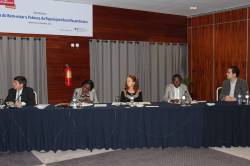
On 15 May, at Indy Village in Maputo, 250 researchers, academics, government officers, civil society actors, journalists and older people gathered at the invitation of the Institute for Economic and Social Research (IESE) and HelpAge International to discuss the dynamics of wellbeing and poverty of older Mozambicans.
Sharing findings
This public seminar provided the perfect opportunity to share early findings from IESE’s recent research, which interrogated existing data from the national census, household budget survey and other studies through an ageing lens.
Moderated by journalist Mercedes Sayagues, a panel of experts debated the study’s findings. From IESE, Gustavo Toshiaki presented the results of demographic and poverty analysis, while Professor Antonio Francisco provided a robust argument for further analysis into the feasibility of a universal pension. Sergio Falange, representing the Civil Society Advocacy Platform for Social Protection, and Elsa Alfai, representing the Ministry of Women and Social Action, responded to the presentations.
Scratching the surface
The study shed light on the complex reality of older people’s lives in Mozambique, with the findings sometimes challenging, and sometimes confirming, our assumptions and observations. It illuminated the living conditions of older people and scratched the surface of the story of Mozambique’s demographic change. The study found huge regional variations in the proportions of households with older people – from 5 per cent in the north to 45 per cent in some areas in the south. At the same time, it found that over 90,000 Mozambicans are already aged over 80, with this figure expected to reach 10 million by 2080. Worryingly, the study presented clear evidence that almost 60 per cent of households with older people live below the national poverty line and 82 per cent are living on less than US$1.25 per day.
Proposal for a universal pension
With a growing older population and traditional social protection structures no longer able to meet need, the debate turned to how to guarantee a minimum income for older Mozambicans. New systems tailored to formal sector workers, such as social security payments, and initiatives for informal sector workers, such as individual capital investments, are not yet ready or capable of providing this guarantee. With these considerations in mind, a universal social pension was proposed – supported by IESE’s findings that, dependent of transfer value, a universal pension could play a significant impact not only in reducing poverty but also in boosting local economies.
What next for this debate?
The seminar provoked a passionate response, with the debate covering questions of culture and gender, of development policy priorities, and of fiscal space and sustainability as well as exploring the efficiency and coverage of current social protection systems. This fertile discussion generated ideas for further research to build on these initial findings and produced four main messages:
1. With a review of Mozambique’s National Basic Social Security Strategy scheduled for 2014 and the recent approval of a law on older people’s rights, the timing of this research is excellent. Key findings are expected to contribute to the 2014 review.
2. The discussion demonstrated the need for deeper analysis within the study. Could a gendered-lens be used to explore the household income survey? Would a deeper analysis of the household data against HIV prevalence and mortality shed light on the regional variations already identified?
3. More research is needed, with the initial findings raising more questions than they answered. How are traditional support structures functioning now? How do investments in households with older people benefit children? What mix of systems might work, now and in the future, to guarantee a minimum income for older people?
4. A shared methodological approach is needed for studies on poverty and social protection to minimise contradictory findings.
Challenging assumptions
The seminar challenged assumptions about Mozambique’s small but growing older population. It found that while older people may contribute less, most are still working. And though they may be excluded from formal financial and social protection systems they are included as active members in many household systems. Finally, the biggest assumption it challenged was that a small older population means that Mozambique does not need to take immediate action. Quite the opposite, it is at this early phase in the demographic transition that Mozambique needs to develop public policies that take account of its ageing population and include older people as active contributors to development.
As more Mozambicans reach old age, but a secure and dignified income remains the preserve of a privileged few, the study asks what is it worth to live longer if it is only to live in poverty?
Learn more
The study is currently being
completed and will incoporate questions raised at the seminar as well as comments submitted online. It will be available through IESE and HelpAge International. Research was funded by the German Federal Ministry for Economic Co-operation and Development (BMZ)
Read Janet Duffield’s blog introducing this research.
